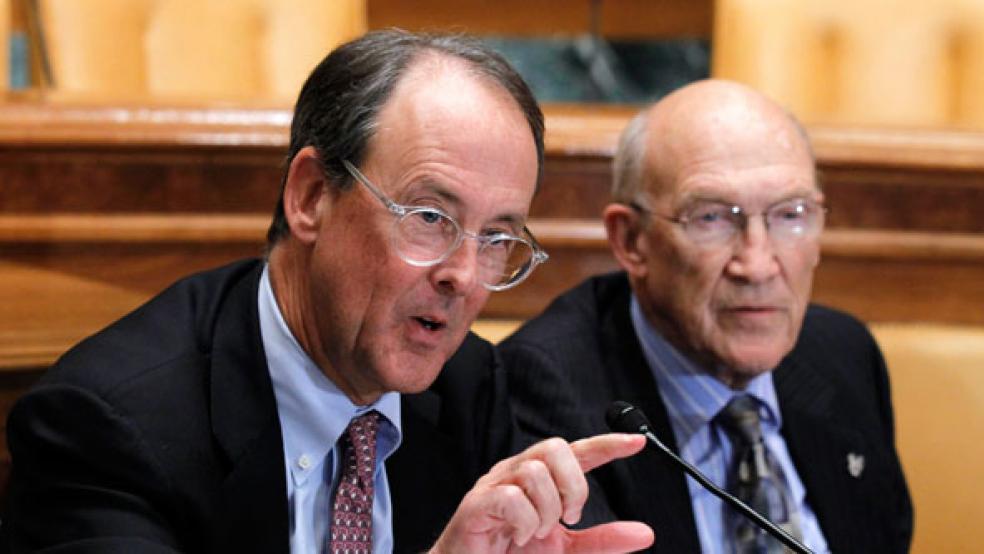An unusual mix of 100 corporate CEOs, economists, former government officials and the two leaders of President Obama’s bipartisan fiscal commission on Thursday urged the White House and Congress to set aside growing differences and swiftly negotiate a long-term deficit reduction plan.
With Obama and House Republicans staking out very different approaches to reducing the deficit by $4 trillion in the coming decade, the group issued a statement saying there can be “no preconditions” and that every part of the budget – including spending and tax revenues – must be considered.
“We must call upon our elected policymakers to recognize our challenges and take action,” the high-powered group said in a letter to the president and members of the House of Representatives. “This is not an opportunity for political gain; far too much is at stake. The nation needs strong leadership and bold action today to significantly decrease our deficit.”
The statement released at a morning press event indicates the business community is getting restless—especially after Standard and Poor’s downgraded its rating of U.S. debt from stable to negative earlier this week.
“Amid all the sound bites from both parties, I don’t feel the sense of urgency that’s necessary to address it,” said Carl Camden, chief executive officer of Kelly Services, a workforce management consulting company. “The patience of lenders, even lenders to the U.S. government, is not infinite."
Those who signed the statement included IBM Vice President Patrick Toole, Columbia Business School Dean R. Glenn Hubbard, and the co-chairmen of Obama’s fiscal commission, Democrat Erskine Bowles and former Republican Sen. Alan Simpson of Wyoming. The group implored lawmakers to return to the deficit-reduction negotiating table and consider tax reform, entitlement programs, domestic spending, and defense spending --even if it means some businesses will take a hit. The statement said it would not castigate lawmakers for making the tough choices.
“We know some businesses will be hurt in some ways, some will lose cherished tax credits or special deductions,” said Joseph Kasputys, Founder and Chairman Emeritus of IHS Global Insight. “But business has to do its part,” he added. Though Bowles and Simpson voiced support last week for Obama’s plan, they implicitly were signaling concern today that Obama and GOP leaders were moving apart in their views and need to find common ground. Others who signed the statement were former Congressional Budget Office Director Alice Rivlin and former Senate Budget Committee Chairman Pete V. Domenici, R-N.M., who jointly led another blue-ribbon deficit reduction panel.
Last week, Bowles and Simpson likened the President’s plan to their commission’s proposals. “While the President’s proposal takes longer to get to the budget reductions we recommended, it does reduce our deficits by $4 trillion over the next 12 years.”
Both Obama’s and the GOP plan drafted by Rep. Paul Ryan, R-Wis., would cut roughly $4 trillion from the deficit over ten years, but have starkly different ways of achieving those savings. Ryan’s plan, which was approved by the House last week, calls for overhauling Medicare and Medicaid to garner enough savings to keep tax increases off the table, and even drop the top corporate and individual tax top rates from 35 percent to 25 percent. The Obama plan unveiled last week would cut military spending, increase taxes for the wealthy, and would trim spending on Medicare, though less severely than the Ryan plan which would convert the program into a voucher system for seniors to buy private insurance.
Both Obama and Ryan are on the road this week touting their respective plans. Obama is using a 2012 campaign fundraising trip to the West Coast to drum up support for his deficit plan and sharply criticize Ryan’s blue print. “Nothing is easier than solving problems on the backs of people who are poor, powerless, or people who don’t have lobbyists or clout,” Obama said Wednesday at Facebook headquarters in Palo Alto where he called Ryan’s plan “radical.” Meanwhile, Ryan spent time in his district earlier this week, where a group of his constituents booed Ryan’s explanation for his ideas for cutting taxes on the wealthy.
Despite the high-profile nature of both plans, “it’s not like anyone has absolutely hit a home run and the game is over,” said Joseph Minarik, Senior Vice President of the Committee for Economic Development—the group that put out the CEOs’ statement. “We need a plan to which both sides [Democrat and Republican] will agree and it’s pretty clear it will be different from either Obama’s or Ryan’s.”
Related Links:
Deere CEO: Political Debt Rancor Could Shock Economy (CNNMoney)
Business Group Pledges Support for U.S Lawmakers to Cut Budget Deficits (Bloomberg)
Obama Seeks Friends for Deficit Plan (The Washington Post)


